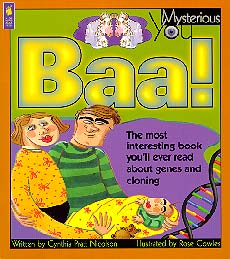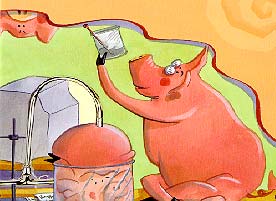| ________________
CM . . .
. Volume VIII Number 9 . . . . January 4, 2002
exerpt:
The third title in the "Mysterious You" series, this book examines how human cells work. Topics include natural selection, dominant and recessive genes, DNA, genetic mutations, forensic science and cloning. Nicolson's use of simple language and kid-friendly examples, along with Cowles's colourful, cartoon-like drawings, serve to make what can be fairly complicated subject matter easily understood by students. "You Try It" sections provide fun experiments to reinforce the concepts in the chapter. In the first of four chapters, Nicolson discusses family traits that are passed along through genes and discusses why identical twins behave so much alike, even if they are raised apart. The second chapter explains DNA and the role of various cells in the human body. Because no two people on earth have the same DNA (with the exception of identical twins and triplets), DNA analysis has been used successfully in criminal investigations and in preventing forgery. Gene mapping, mutations and research into finding and fixing faulty genes are discussed in Chapter Three. The remainder of the book is devoted to the topic of the cloning of animals and the future of genetic research with its inherent problems and solutions. A glossary and an index are provided.
The harmonious blend of interesting text and an attractive, artistic layout will appeal to readers. Not only is this book informative and entertaining, but it is also bound to spark some discussion on the moral and ethical issues of human cloning. Highly Recommended. Gail Hamilton is a teacher-librarian at Bird's Hill School in East St. Paul, MB.
To comment on this
title or this review, send mail to cm@umanitoba.ca.
Copyright © the Manitoba Library Association. Reproduction for personal
use is permitted only if this copyright notice is maintained. Any other
reproduction is prohibited without permission.
Published by
NEXT REVIEW |TABLE OF CONTENTS FOR THIS ISSUE - January 4, 2002.
AUTHORS
| TITLES | MEDIA REVIEWS
| PROFILES
| BACK ISSUES
| SEARCH | CMARCHIVE
| HOME
|

